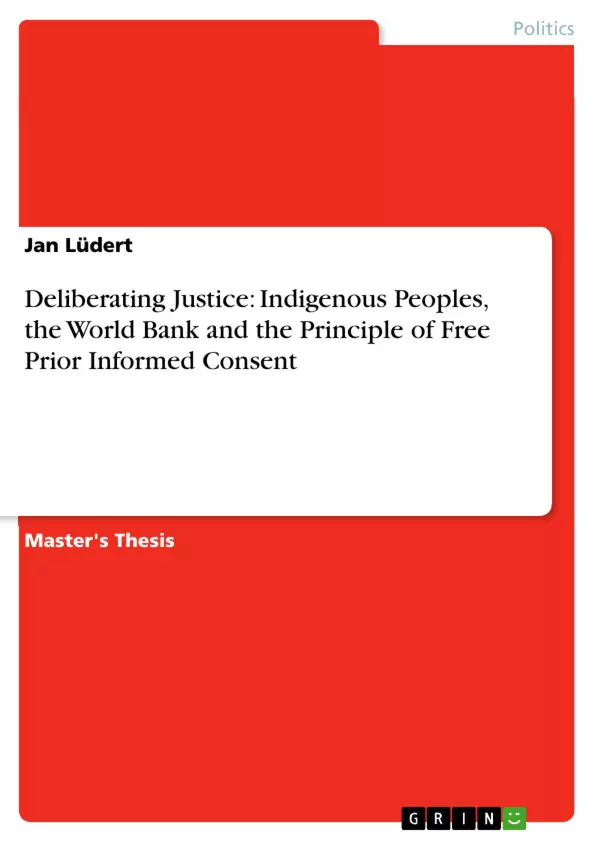This thesis aims to reflect upon some of the bigger questions of
international development. It investigates a general relationship between
the World Bank vis a vis demands made by indigenous peoples, namely
questioning of how to advance development goals in ways that uphold the
justice needs of minorities such as indigenous peoples, further how to
achieve a just balance between national prosperity and minority survival,
and more broadly, how to further balance the complexities of global, local
and national interests. This thesis seeks a stronger middle ground
between the Bank and indigenous peoples and focuses, on the
importance of deliberation, in general, and the principle of free prior
informed consent, in particular.
The argument put forward here is normative and envisages emancipating
from the singularity of the modern development paradigm in opening a
deliberative space that provides for diversity and difference to flourish
instead. Here specifically acknowledging indigenous peoples values and
interests as equally important in development, this thesis supports a
deliberate and affirmative approach to justice. This of course does not
mark the prevailing top-down, state-centric and neo-liberal development
paradigm as malign, rather it envisages exchanging its power base for
bottom-up participatory deliberation.
Inhaltsverzeichnis (Table of Contents)
- Introduction
- Chapter 1 Indigenous Peoples: Rights in the Development Process
- Chapter 2 The Evolution: World Bank Policy on Indigenous Peoples
- Chapter 3 Deliberative Justice: Mediating a Stronger Middle Ground
Zielsetzung und Themenschwerpunkte (Objectives and Key Themes)
This thesis aims to examine the relationship between the World Bank and indigenous peoples, focusing on how to achieve development goals in ways that uphold the justice needs of minorities. It seeks to find a balance between national prosperity and minority survival, and more broadly, how to further balance global, local and national interests. The thesis advocates for a stronger middle ground between the Bank and indigenous peoples, emphasizing the importance of deliberation and the principle of free prior informed consent.
- The role of indigenous peoples in the development process
- The evolution of World Bank policies regarding indigenous peoples
- The principle of free prior informed consent as a means of achieving justice
- The importance of deliberation in development
- Balancing national interests with the rights of minorities
Zusammenfassung der Kapitel (Chapter Summaries)
Chapter 1 delves into the rights of indigenous peoples in the development process, exploring their historical experiences and contemporary challenges. Chapter 2 traces the evolution of World Bank policies regarding indigenous peoples, analyzing key shifts in its approach and the implications for indigenous communities. Chapter 3 focuses on deliberative justice, arguing that it offers a potential solution to the complex relationship between the World Bank and indigenous peoples. This chapter examines how deliberation can facilitate a more equitable and just development process that respects the rights and values of indigenous communities.
Schlüsselwörter (Keywords)
The main keywords and focus topics of the text include indigenous peoples, World Bank, development, justice, free prior informed consent, deliberation, minority rights, national prosperity, global interests, local interests, and participatory governance. The thesis explores the intersections of these themes to understand how to achieve a more equitable and sustainable development process.
Frequently Asked Questions
What is the principle of Free Prior Informed Consent (FPIC)?
FPIC is a specific right for indigenous peoples to give or withhold consent to projects that may affect them or their territories, ensuring they are informed and participate freely in the decision-making process.
How has World Bank policy on indigenous peoples evolved?
The Bank's policies have shifted from a top-down, state-centric approach toward more participatory models, though challenges remain in balancing national economic goals with minority rights.
What is "deliberative justice" in the context of development?
Deliberative justice emphasizes open dialogue and negotiation between institutions like the World Bank and local communities to reach a fair balance between global interests and local survival.
Why is there a conflict between national prosperity and indigenous survival?
Conflicts often arise when national development projects (like dams or mines) exploit resources on indigenous lands, potentially threatening the cultural and physical survival of those communities.
What is the main goal of this thesis?
The thesis seeks a "stronger middle ground" between the World Bank and indigenous peoples by advocating for affirmative approaches to justice and bottom-up participatory deliberation.
- Citar trabajo
- Jan Lüdert (Autor), 2007, Deliberating Justice: Indigenous Peoples, the World Bank and the Principle of Free Prior Informed Consent, Múnich, GRIN Verlag, https://www.grin.com/document/90017



